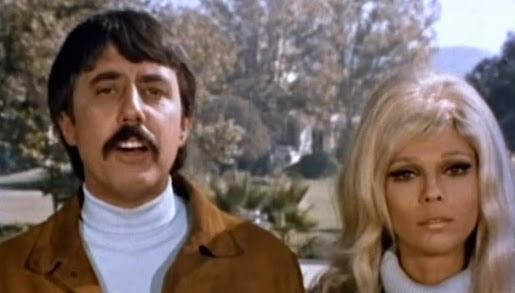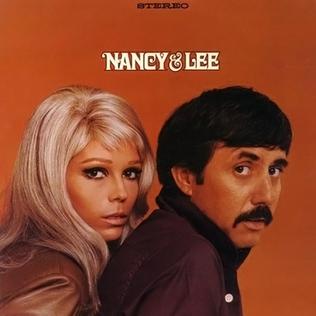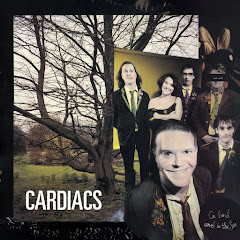Nancy Sinatra & Lee Hazlewood - Nancy & Lee Again
"I'll Never Eat That Pie"
Suggested to me via Twitter by Mark Dyball
This is what I knew in advance: Nancy is Frank's daughter, obviously; famous for 'These Boots Are Made for Walkin'' and the theme to the Bond film You Only Live Twice. She had also appeared in my You Must Get Them All blog via The Fall's cover of 'The City Sleeps Tonight'. As for Lee, he had also cropped up in my Fall blogs: 'Loop41 ‘Houston' was a cover of one of his songs. In addition, the two of them recorded 'My Elusive Dreams', which MES referenced in 'The Reckoning'.
Hazlewood was a complex character. According to a 2013 Guardian article:
'He was funny, charismatic and supportive but he could also be cold, vengeful and mean. Like Serge Gainsbourg, he made both exquisitely subversive pop music and cynical kitsch, and gave the impression that he regarded his career as a private joke with financial benefits. The only niche he inhabited was the one he carved for himself, and that could get lonely.'
He died in 2007: there's an obituary here.
Arkansas Coal (Suite)
The album serves up its best track first. As the parenthetical part of the title suggests, 'Arkansas' is made of several different sections; it's almost 'country-prog' in the way it stitches together disparate passages that flow effortlessly into each other.
A gently reverberating introduction pairs Hazlewood's deep growl with Nancy's gentle melody; the moment (0:45) where the percussion and brass section kick in over 'Arkansas coal' is beautifully timed and simply delicious. An up tempo passage emerges at 1:26, led by Hazlewood, that includes some Tom Waites-esque metallic percussion. Around halfway, the track settles into a woozy groove, accompanied by some bluesy guitar and jazzy flute. This is followed by a plaintive, dreamy passage then a mid-tempo two-chord section before the gentle reverberations of the opening return to round things off. The combination of Nancy's delivery of 'Arkansas coal' and the re-emergence of the percussion (5:31) is another spine-tingling moment.
In the narrative, Hazlewood is an Arkansas miner who's been digging coal since he was nine. Nancy takes both the part of his wife ('married me a good man / back in '59 / knew he was an Arkansas coal miner / and that suited me fine') and his eight year old daughter. It doesn't end well: 'My god, the rocks are falling / ten thousand tons on my head / I knew someday this would happen / so this is how it feels to be dead'.
It's extraordinary: a complex, delicate gem. I am really grateful to Mark for having introduced me to this song.
Big Red Balloon
From country-prog to country-psych-pop. It's an 'I'm leavin' you woman' kind of song, supported by angelic backing vocals and lush strings. The twist is that for some reason Hazlewood is making his exit via hot air balloon. The song ends with Nancy haranguing him for his foolishness: 'What are you doing up there? Bring that damn thing back down here!'
A tale of male mid-life crisis, it strikes a successful balance between humour ('woman stop your cooking / 'cause I'll never eat that pie') and bitterness ('You never gave me loving / you never were the kind / you never gave me children / you never had the time').
Friendship Train
A mix of traditional country ballad (albeit with some sprightly flute that gives it a slightly jazzy tinge) and swirling, urgent orchestration that tells the tale of two bruised lovers who find strength through friendship. It flirts with being overdone, but just about retains a winningly tender, emotional tone.
Paris Summer
The story of a doomed adulterous affair ('I took the wedding ring off of my hand / before he put his arms around me') by the banks of the Seine. A little melodramatic, but it's hard not to be won over by lines like 'when I left, the tears I cried he thought were just the rain'. I don't normally go for this sort of thing, so I have to credit the quality of the song-writing and arrangement for sweeping me along with the melodrama.
Congratulations
A string-laden ballad that explores the depression of a man who 'doesn't feed pigeons or sing in the shower' or laugh any more. Apparently an anti-war song about post-traumatic stress disorder, although the identity of 'P.F.C. Williams' who 'is just plain Old Jimmy again' is not something I've been able to unearth. It's a lovely melody and a powerful arrangement, although perhaps just a tad sugary.
Down From Dover
For me, the second strongest track on the album. A Dolly Parton cover, it's another melancholy tale, this time about a pregnant teenager ('this dress I'm wearing doesn't hide the secret I've tried concealing') longing for the return of her lover. Like 'Arkansas', things do not end well: 'Our baby has been born, but something's wrong, it's too still, I hear no crying'. Parton's memorable melody is enhanced by the adaptation of the lyrics to allow Hazlewood to play the part of the absent father. More melodrama, but it's taut and focused in a way that eschews sentimentality. The only misstep is when Nancy overdoes the emoting right at the very end; otherwise, it's stirring and poignant.
Did You Ever
Released as a single in 1971, this was another cover - written by Bobby Braddock and originally released by Charlie Louvin and Melba Montgomery. With its slightly saucy lyric and occasional diversions into what sounds like a 70s UK sitcom theme tune, it has 'novelty song' written all over it, but still has charm.
Tippy Toes
By some distance the album's weakest spot. Hazlewood's ruminations about 'big people' and 'little girl people' that are 'extra special to their daddies' are cheesy to the extreme and not a little creepy. Nancy's schmaltzy vocal is little better, especially when she riffs on the song's title towards the end. Flimsy and banal.
Back on the Road
A spirited toe-tapper that gets the album back on track, even if it's a little predictable. A jaunty road trip.
Got It Together
Some nice harmonies aside, the concluding track is mainly the two of them having a bit of a chat over a two-chord loop. They discuss their ages (he's 42 and she's 30), Nancy's desire to have babies and Howdy Doody. It's rather self indulgent, but just about gets away with it. It concludes with Hazlewood asking if he can 'go back to Sweden now' (he lived in Stockholm from 1970).
Conclusion
Although it's not flawless, Lee And Nancy Again is often touching and beguiling; at times, its melodies and arrangements are stunning, and the harmony between Hazlewood's earthy growl and Nancy's pretty melodicism is often captivating. It has its down points - 'Tippy Toes' is a bit icky, in particular - but overall I enjoyed it far more than I expected to. Many thanks to Mark Dyball for the suggestion.





beautifully written and thanks for undertaking a noble idea. iv'e learnt a lot reading your fall blogs over time.
ReplyDeletei'd agree with almost everything youve said, its a record ive listened to countless times and smaltzy is sprinkled liberally at times but i allow it because of when it was recorded and the craft the stand out tracks shine in.
tippy toes however should never have seen the light of day.
for further eading there is a great memoir on lee hazlewood by wyndham wallace’s called Lee, Myself & I
many thanks